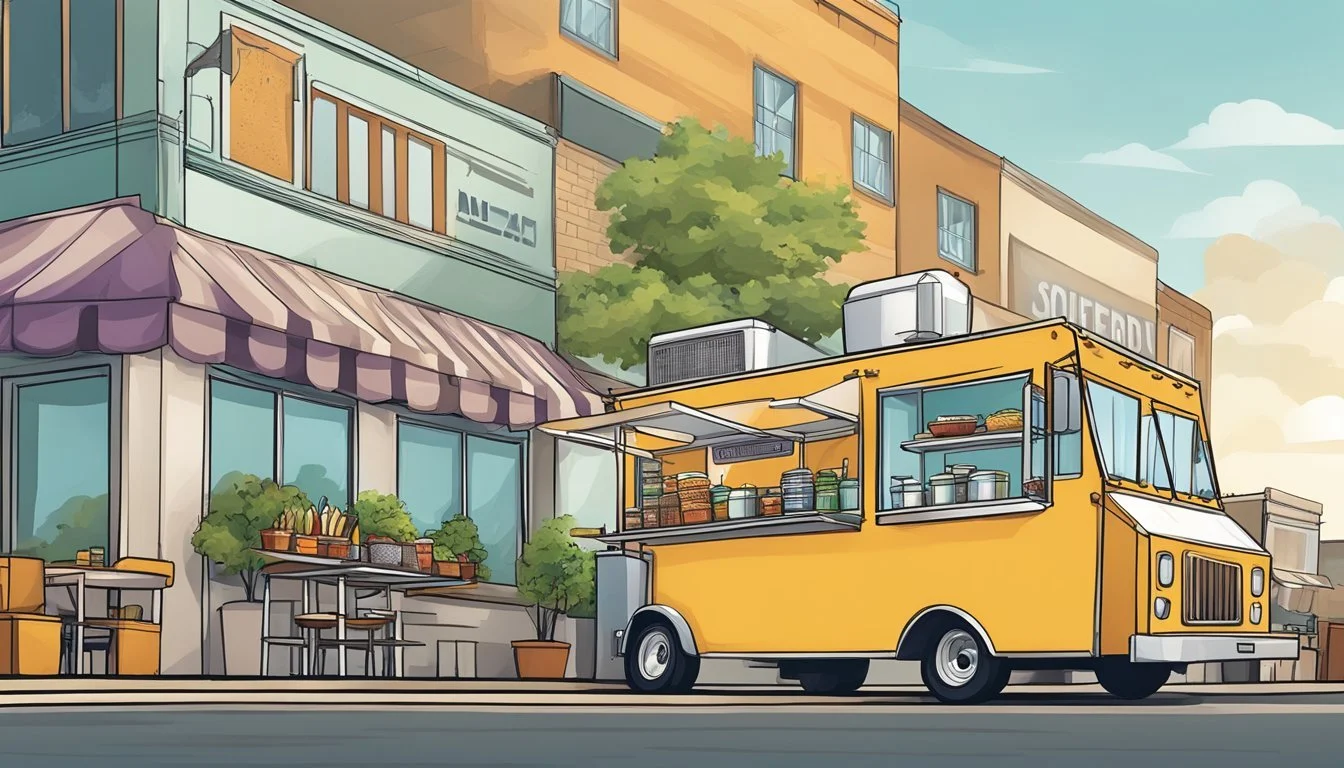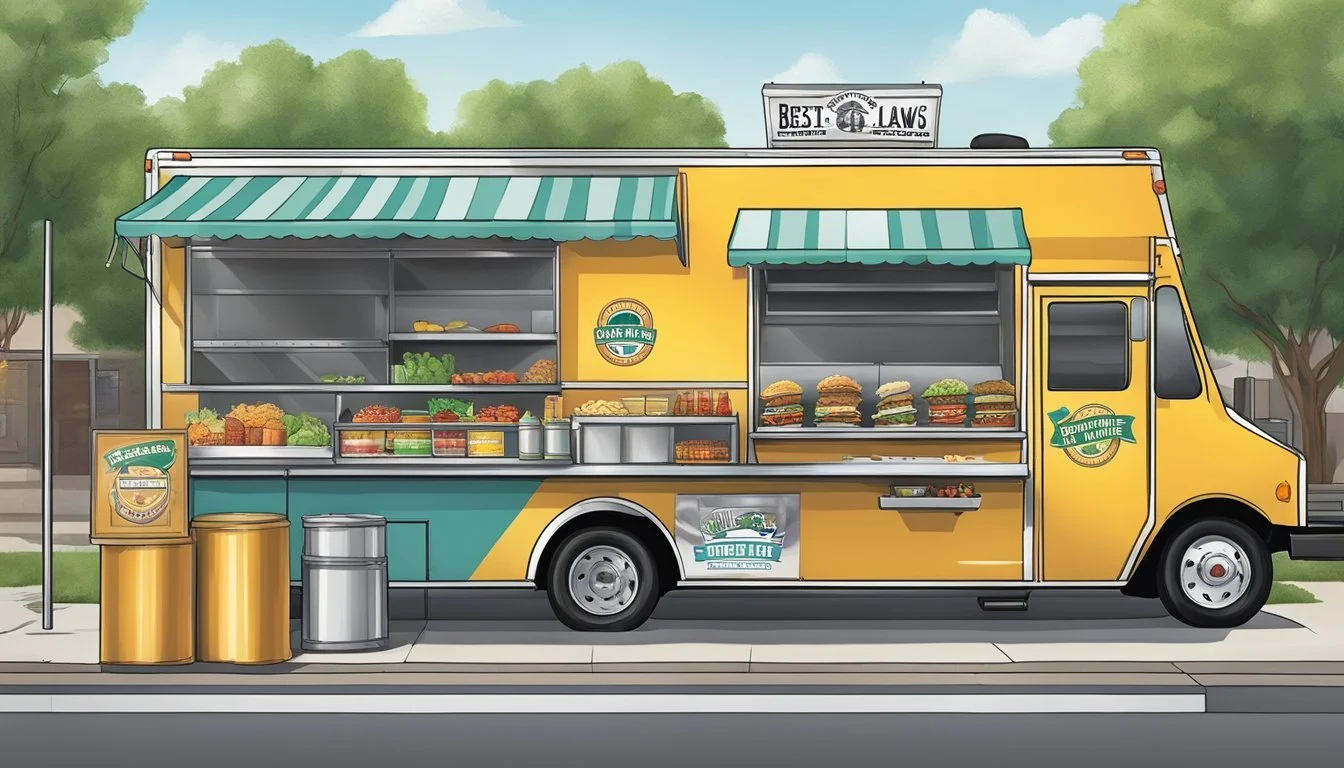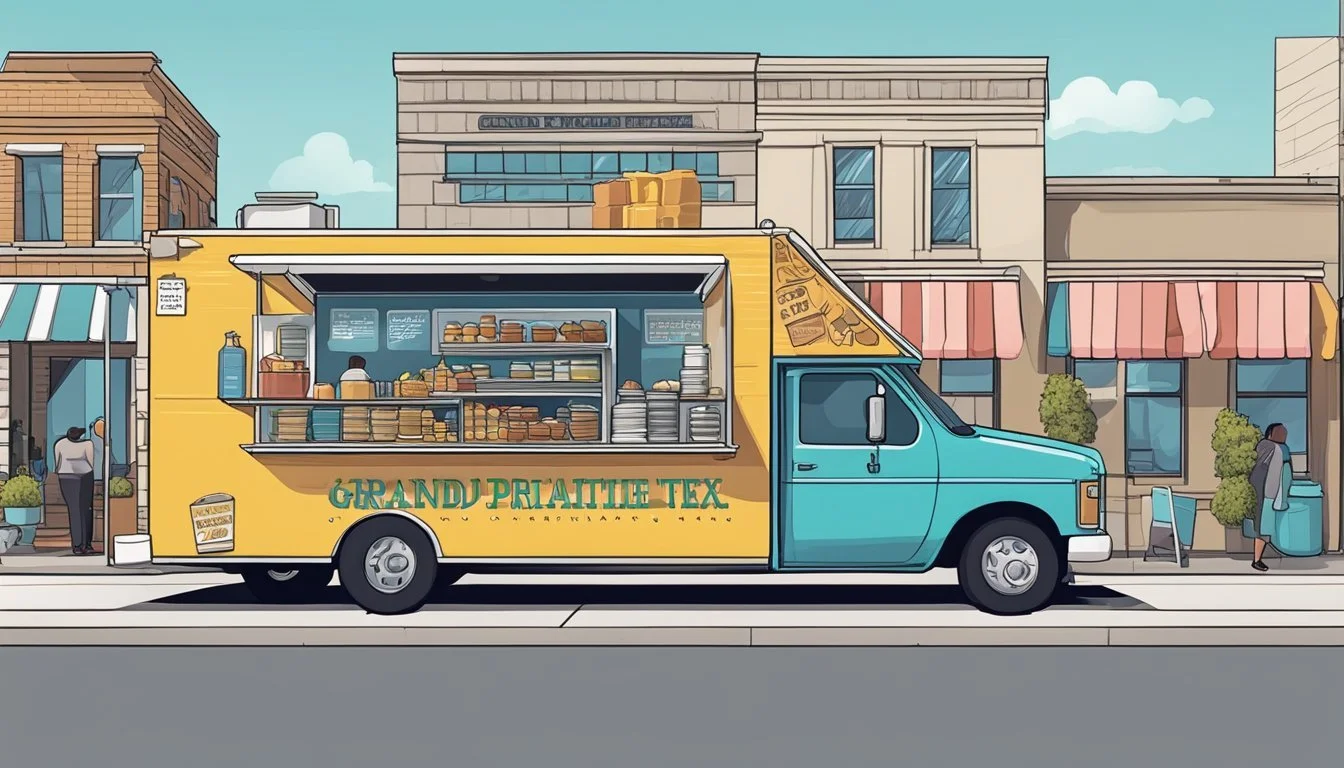Food Truck Laws Grand Prairie, Texas
Understanding Regulations for Mobile Vendors
Operating a food truck in Grand Prairie, Texas, demands adherence to a specific set of regulations designed to ensure public health, safety, and fair business practices. The food truck industry in Texas has surged in popularity, presenting a mobile alternative to traditional brick-and-mortar dining. Consequently, the City of Grand Prairie has implemented policies that food truck operators must adhere to in order to conduct business within the city limits.
These regulations include acquiring a Mobile Food Truck Permit which enforces local zoning laws to confirm that the area in question is approved for commercial activity. Furthermore, all mobile food units must comply with the Texas Food Establishment Rules. For instance, a food truck is required to have a Texas Food Manager Certification with the certified manager on-site during all hours of operation, and all staff must hold food handler cards, highlighting the emphasis on maintaining food safety standards.
Additionally, the municipal code of Grand Prairie has incorporated the Texas Food Establishment Rules as the minimum standards for food establishments within its jurisdiction. This includes the construction and maintenance specifics of the mobile food unit such as a requirement for it to be enclosed and pest-proof. These laws reflect the city's commitment to ensuring that food trucks offer quality service on par with permanent food establishments, blending mobility with the rigor of standardized food safety practices.
Legal Framework for Food Trucks in Grand Prairie
Operating a food truck in Grand Prairie, Texas, calls for adherence to specific regulations to ensure public health and safety. These laws are designed to create a standardized environment for mobile food vendors.
Texas Food Establishment Rules
In Grand Prairie, food trucks are considered food establishments and, therefore, must comply with the Texas Food Establishment Rules (TFER). The TFER constitute a set of state-level mandates that regulate food safety and handling practices, outlining the conditions under which food trucks can operate. This includes proper food storage, preparation, and serving guidelines to minimize the risk of foodborne illnesses.
Permit Requirements
Permit procurement is crucial for any food truck operator in Grand Prairie. To begin operations, the city mandates obtaining a Mobile Food Truck Permit, contingent upon meeting the requisite criteria set by local ordinances. This involves an application with the Public Health and Environmental Quality, ensuring the food truck is authorized to conduct business in designated zones as per current zoning laws.
Inspection Protocols
Finally, diligence in adhering to regular inspection protocols is necessary for continued operation. In addition to the initial inspections required for permit approval, food trucks must pass ongoing inspections from multiple authorities, including the Fire Department and Public Health inspectors. Each successful check results in a validation sticker, ensuring that the food truck maintains compliance with both city regulations and the broader TFER. If a food truck fails any inspection, it must address all issues before it can legally serve customers in Grand Prairie.
Starting a Food Truck Business
Before one launches their food truck venture in Grand Prairie, Texas, they must navigate through several legal requirements. From business registration to acquiring an EIN and considering the right vehicle and equipment, these steps are critical to ensure compliance and operational readiness.
Business Registration
The first step in launching a food truck business is to register the entity. Business owners must file with the Texas Secretary of State and Comptroller business registration, providing the business name and structure, such as an LLC. This ensures the business is legally recognized and able to operate within the state.
Obtaining an EIN
After registration, the business needs an Employer Identification Number (EIN) from the IRS. This unique number is necessary for tax purposes and is required to hire employees. An EIN serves as the federal taxpayer identification for the business.
Vehicle and Equipment Considerations
Selecting the right vehicle is vital. The food truck must be equipped with the necessary facilities to prepare and serve food safely. Additionally, it must pass inspection criteria set by the local health department and may require an inspection from the local Fire Marshal. Compliance with these standards is non-negotiable for a food truck to operate legally in Grand Prairie.
Operational Guidelines for Food Trucks
In Grand Prairie, food truck operators must adhere to specific guidelines to maintain proper food service operations and comply with health and safety regulations. These standards ensure the wellbeing of patrons and the integrity of the mobile food industry.
Food Service Operation
Operating a food truck in Grand Prairie requires obtaining a Mobile Food Truck Permit from the Public Health and Environmental Quality department. The business location must be in compliance with local zoning laws. Operators are expected to maintain regular business hours and facilitate easy communication for both customers and health officials.
Menu Planning and Food Preparation
Food trucks must submit their menu for approval as part of the permitting process. All food items must be prepared, stored, and served in accordance with the Texas Food Establishment Rules. This includes ensuring that all ingredients are fresh, properly labeled, and safe for consumption. Permitted food trucks in Grand Prairie can offer a diverse menu, but each menu item must be prepared with strict adherence to food safety practices.
Health and Safety Regulations
The health and safety of both staff and customers are paramount. It is mandatory for food trucks to pass regular health inspections for continued operation. The Texas Public Health Solutions mandates that these inspections cover the structural integrity of the unit, cleanliness, pest control, waste disposal, and employee hygiene. Moreover, proper training in food handling and safety helps in preventing foodborne illnesses, thereby maintaining the food truck's reputation for quality and safety.
Location and Mobility
In Grand Prairie, Texas, food trucks are subject to specific regulations regarding where they can operate and how they maintain their mobility. These rules ensure that mobile food units can serve the community effectively while adhering to local policies.
Site Selection
The selection of sites for food truck operations must comply with local zoning laws to ensure legality of commerce. In Grand Prairie, a food truck is allowed to conduct business in areas designated and authorized for such use. When choosing a location, operators should reference the City Hall's zoning requirements to avoid legal complications and to integrate smoothly into the fabric of the community.
Mobile Unit Requirements
Mobile food units must comply with state health and safety standards, maintaining the ability to be readily moveable at all times. Per the guidelines set by the Texas Department of State Health Services (DSHS), food trucks are included in this category and should not operate as fixed establishments. This requirement safeguards the mobile nature of the service, allowing for flexible responses to community needs and events.
Community Engagement
Engagement with the community is pivotal for food truck operators in Grand Prairie. They must balance business objectives with community standards and expectations. Proactive communication and collaboration can help mobile food units embed themselves into local events and daily life. Registering with the City and acquiring the necessary certifications demonstrate a commitment to quality and safety—keys to successful integration into Grand Prairie's vibrant food scene.
Financial Aspects of Running a Food Truck
In Grand Prairie, Texas, as with any location, the financial success of a food truck relies on meticulously managing the cost of operations and pricing, keeping regular expenses under control, and implementing strategies to maximize profits.
Cost Analysis and Pricing Strategy
Conducting a thorough cost analysis is critical for food truck owners. They must calculate the cost of ingredients, supplies, and labor to determine how much it costs to produce their menu items. For instance, the cost to make a specialty burger could include not just the ground beef and bun, but also condiments, vegetables, and even the cooking gas. Once the cost is understood, they can develop a pricing strategy that achieves a balance between remaining affordable for customers and ensuring a reasonable profit margin. The recommended pricing strategy should include:
Competitive analysis to understand market rates
Calculation of food cost percentage (typically 25-35% for food trucks)
Contingencies for market fluctuations
Managing Operating Expenses
Food truck operators in Grand Prairie must keep a sharp eye on operating expenses. These include but are not limited to:
Fuel costs - both for driving and powering cooking equipment
Maintenance - to ensure the food truck is in good operating condition
Permit and license fees - such as the Mobile Food Truck Permit required by Grand Prairie
Commissary fees - if utilizing a commercial kitchen for food prep or storage
Insurance premiums - for liability and vehicular coverage
Employee wages - a necessity for running larger operations
Efficiently managing these costs is pivotal in maintaining the financial health of the food truck.
Profit Maximization Tips
To maximize profits, food truck operators are advised to:
Leverage Special Events: Catering to local events can lead to higher sales volumes.
Optimize Menu Items: Streamline the menu to focus on popular and high-margin items.
Engage in Local Marketing: Use social media to attract and retain a local following.
Monitor Food Waste: Implement inventory tracking to reduce losses.
Embrace Technology: Use point-of-sale systems to quicken transactions and track analytics.
Following these strategies, food truck owners can work to ensure that their venture is not just a culinary hit, but also a financial success.
Compliance and Best Practices
In Grand Prairie, Texas, food truck operators must adhere to strict regulations to ensure public health and safety. These regulations are enforced through inspections, and compliance is reflected in the food truck’s grade, which customers often review before dining.
Waste Disposal and Sanitation
Regulations require that food trucks in Grand Prairie maintain high sanitation standards. Waste disposal is critical, and operators must have a plan for managing trash, with proper containers for garbage and recyclable materials. Sanitation also covers the availability of a proper hand-washing station with running water, soap, and paper towels to ensure food handlers can maintain proper hygiene.
Fire Safety and Emergency Protocols
Fire safety is a major concern for mobile food vendors. Food trucks are required to undergo an inspection by the local Fire Marshal and must have fire extinguishers and other fire-suppression systems in place. Emergency protocols, clearly posted and understood by all staff, are a best practice to foster a safe environment for both employees and customers.
Food Truck Grades and Reviews
Food truck grades, often posted prominently on the vehicle, reflect the outcome of regular health inspections. These grades inform potential customers about the cleanliness and compliance of the establishment. High grades typically lead to more favorable reviews and indicate that the food truck has met or exceeded health and safety regulations during the inspection. Customers value transparency and often choose food trucks based on these visible grades.
Additional Considerations for Food Truck Operators
Managing a food truck in Grand Prairie, Texas, involves meticulous attention to detail. Operators must navigate a range of regulations—especially concerning packaging, the use of prepackaged foods, and the shifting demands of local weather and seasonal changes.
Packaging and Presentation
Food truck operators should prioritize eco-friendly packaging to comply with environmental standards and enhance customer appeal. In Grand Prairie, packaging solutions must not only protect the food during service but also be aligned with local waste management policies. For example, glass and foam containers are often discouraged. Efficient packaging that maintains food quality without excessive waste will reflect positively on the food truck's brand image.
Use of Prepackaged Food
The use of prepackaged food is subject to strict regulations in Grand Prairie. Operators must ensure these items meet all health and safety requirements set by the Texas Food Establishment Rules. They must store prepackaged foods at appropriate temperatures, with refrigerator and freezer units regularly inspected and maintained to prevent product spoilage, and comply with labeling laws that provide consumers with ingredient, allergen, and origin information.
Adapting to Weather and Seasonal Changes
Adaptability to weather and seasonal changes is crucial for food truck operators. A trailer's interior must be designed to keep staff comfortable and food safe despite temperature fluctuations. Moreover, operators should adjust their service windows to match the city's guidelines, such as the allowable hours of operation between 7:00 a.m. and 7:00 p.m. for stationary mobile units, and consider menu changes that reflect seasonal availability and customer preferences.






